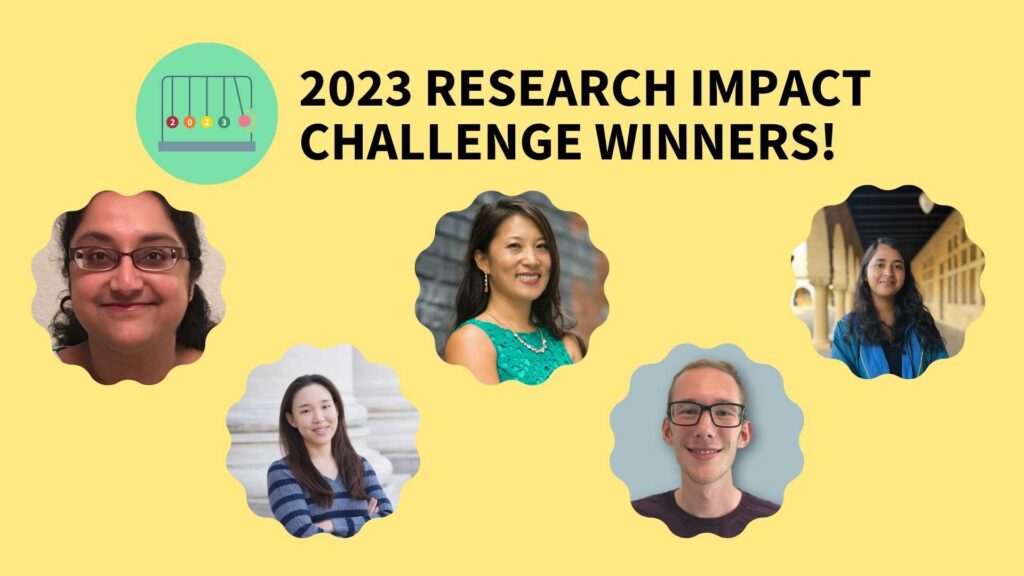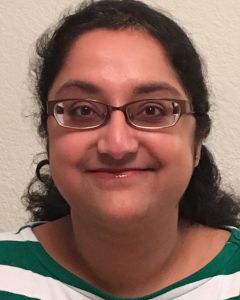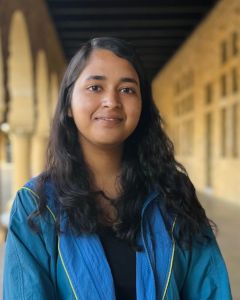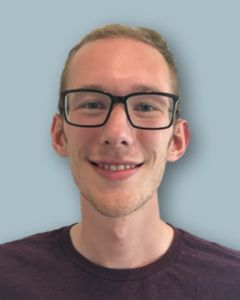
Announcing the 2023 Research Impact Challenge Winners
Please join us in recognizing the five winners of the 2023 Research Impact Challenge Raffle! Congrats to everyone who participated in the challenge activities this year.
Missed the challenge this year? You can continue to take advantage of the 2023 challenges and access challenge class recordings on the Research Impact Challenge webpage. For more information on the use and assessment of research metrics, please visit the Research Impact Guide.
Get to Know the Winners

Komal Dasani
Komal Dasani is a Program Manager in the Division of Pediatric Endocrinology and Diabetes, in the Department of Pediatrics at Stanford University. She earned her MPH from the University of Kansas Medical Center (KUMC). After graduating, Komal moved to Madison, Wisconsin where she worked as a coordinator for the University of Wisconsin–Madison on a grant program funded by the Robert Wood Johnson Foundation (RWJF). She remained on the program for 3 years before transitioning to Stanford where she joined the role of a fellowship coordinator in the Department of Medicine. In her current role, Komal manages the multi-center National NIH K12 DiabDocs Program, in the Department of Pediatrics, and helps in supporting the academic research career development of the next generation of physician-scientists with a specific focus in basic and clinical diabetes.
While in college, Komal met her husband, Alok Nerurkar, who works as a researcher in a pharmaceutical company. They reside in San Diego, CA, and both enjoy traveling the world and exploring different cultures through their diverse cuisines.

Ananya Goyal
Ananya Goyal (she/her) is a 4th year Ph.D. candidate in Bioengineering. Her research is focused on the imaging of joint function using PET-MRI methods in people with osteoarthritis. She is a part of the Radiological Sciences Laboratory and the Wu Tsai Human Performance Alliance. Outside of academics, Ananya enjoys cooking, exploring new restaurants and cafes, and spending time with friends and family.

Sonia Nan Kim
Sonia Kim is a post-doctoral research fellow in the Chang lab at Stanford. She studies the landscape of circular RNAs in the brain.

Ben Richard Kraemer
Ben is a fourth-year Chemical & Systems Biology graduate student in the Mochly-Rosen lab. He received a B.S. in neuroscience with minors in chemistry and Spanish from the University of St. Thomas in St. Paul, MN. During his undergraduate career, he worked on synthesizing novel antibacterial agents to treat multi-drug resistant tuberculosis and also performed cognitive psychology research investigating the evolutionary psychology of memory. Currently, he is interested in the aldehyde dehydrogenase family of enzymes and how variants of these enzymes contribute to the pathology of various diseases.

Lesley Park
Dr. Lesley Park is a co-founding director of the Stanford Advancing Health Equity and Diversity (AHEaD) summer research program for college students from underrepresented and historically excluded groups in the health sciences. She is also the Executive Director of the VACS consortium, an international collaboration of methodologists, clinicians, and trainees who utilize the rich and valuable data from the Veterans Health Administration to do impactful research. VACS has been at the forefront of research to understand aging with HIV to improve patient care, particularly with respect to alcohol and other substance use, physiologic frailty, and polypharmacy. Her research experience has focused on the intersection of cancer and HIV. Dr. Park teaches courses in computing, data management, and epidemiologic analysis methods.
Takeaways from the Research Impact Challenge
Which challenge did you find the most helpful?
Komal Dasani: Claiming my ORCID ID and linking it to my SUNet ID. I found the process to be most helpful as it centralizes all research activities of an individual and keeps their work connected throughout their career.
Ananya Goyal: I found the Day 5: Use Appropriate Metrics challenge the most helpful, as I was able to complete the self-inventory of my work and how I think about the impact it has on people. It involved a lot of active engagement and thought into my values, which was an insightful experience.
Sonia Nan Kim: The two challenges I found most helpful were claiming professional profiles and tracking my scholarly work. I had done some of these tasks previously several years ago but there have been some updates since then that needed to be completed. Luckily the library resources were very helpful in completing these tasks.
Ben Richard Kraemer: I found the 5th day’s challenge most helpful because it provided a new database to explore the impact my work has in a convenient database with the ability to easily share the content.
Lesley Park: Learning about Search Engine Optimization – now that most of our work is available and indexed in PubMed, it’s helpful to learn some of the “hidden strategies” in getting an article returned on a search and noticed.
What is your biggest takeaway from the Research Impact Challenge?
Komal Dasani: My biggest takeaway from the challenge is how important it is to promote your work by increasing visibility, sharing data and how Stanford Libraries make it extremely easy for researchers to track and integrate their scholarly work with specific tools and databases.
Ananya Goyal: I completed the challenge last year, and after repeating it this year, I learned that there are always more (and new) ways of increasing your work’s impact and visibility.
Sonia Nan Kim: The challenges are a great annual refresher and reminder of the tasks that we might forget to do on a regular basis.
Ben Richard Kraemer: My biggest takeaway is that there are multiple ways that we as scientists can measure our impact beyond citations. The challenge provided a mechanism where we can track other forms of engagement with our work through blogs and social media.
Lesley Park: Lane Librarians have tons of great tips and know the trends and tools to use for research dissemination – I will keep in better touch with my librarian to learn the latest!
Check Out Their Research
Komal Dasani
Promoting Career Development of Physicians Engaged in Type 1 Diabetes (T1D) Research—The New DiabDocs Multicenter National K12 Program: I presented the above poster at the 83rd Scientific Sessions of the American Diabetes Association (ADA) in June 2023, in San Diego, CA. The work goes over the newly established DiabDocs program, funded by the NIDDK at NIH, its program goals, recruitment methods for Scholars, and how it helps address the critical shortage of trained physician-scientists focused on type 1 diabetes.
Ananya Goyal
Imaging of joint response to exercise with MRI and PET: In this review article, we examine methods utilizing quantitative MRI, PET, and hybrid PET-MRI systems for assessment of the joint response to loading from exercise in vivo.
Evaluation of metabolic response in bone marrow lesions after exercise in relation to changes in adjacent cartilage T2 values: In this feasibility study, we detect acute loading-induced changes in [18F]NaF uptake in bone regions with BMLs and compare corresponding changes in cartilage T2 values.
Sonia Nan Kim
MIPP-Seq: ultra-sensitive rapid detection and validation of low-frequency mosaic mutations: MIPP-Seq is an ultra-sensitive, low-cost approach for detecting and validating known and novel mutations for research and clinical diagnostic applications.
Ben Richard Kraemer
Natural variants in SARS-CoV-2 S protein pinpoint structural and functional hotspots: implications for prophylaxis and therapeutic strategies: We analyzed sequence information from the Spike protein of SARS-CoV-2 to identify conserved domains across viral variants that may be effective targets for prophylactics and therapeutics for COVID-19.
Lesley Park
Prevalence of non-HIV cancer risk factors in persons living with HIV/AIDS: A meta-analysis: The burden of cancer among persons with HIV (PWH) is substantial and increasing due to impaired immune function and high prevalence of modifiable non-HIV cancer risk factors; this meta-analysis provided quantitative evidence of cancer risk factor prevalence among PWH.
Thank you to everyone who participated in our 2023 Research Impact Challenge! Lane Library can help year-round with your research impact questions. See our Research Services page for more information.